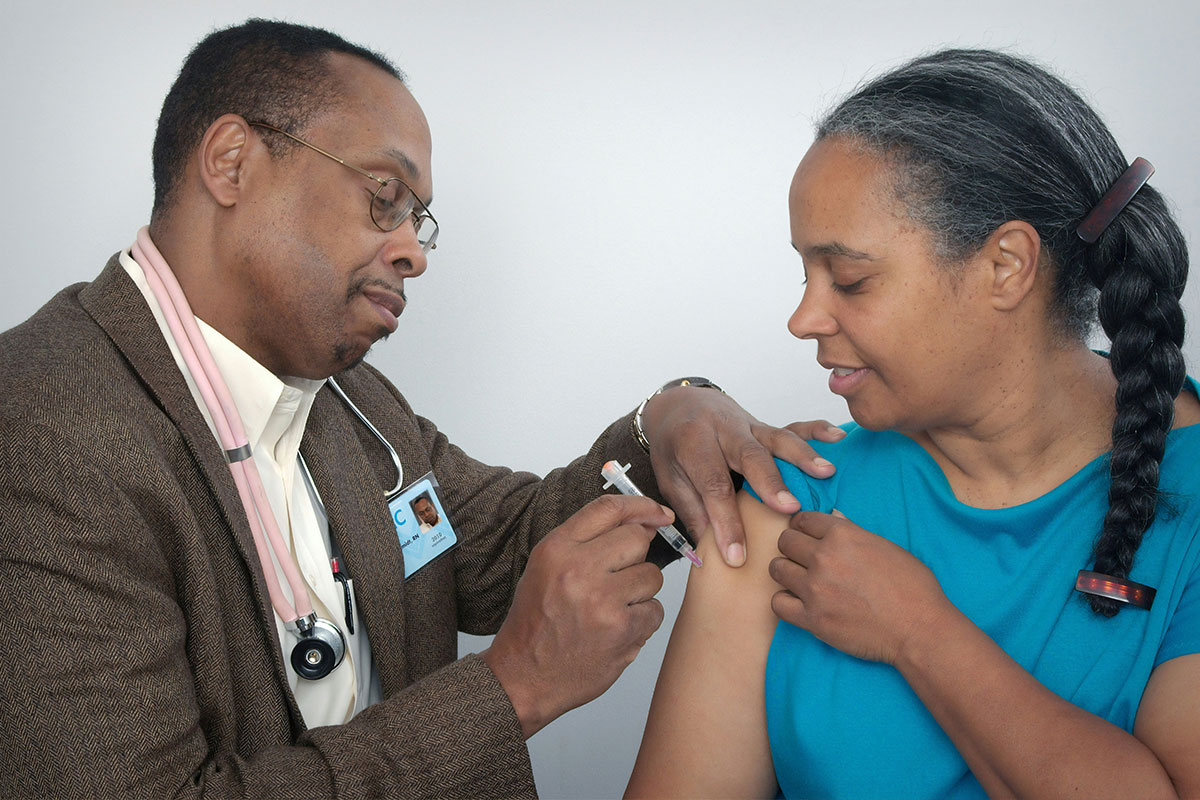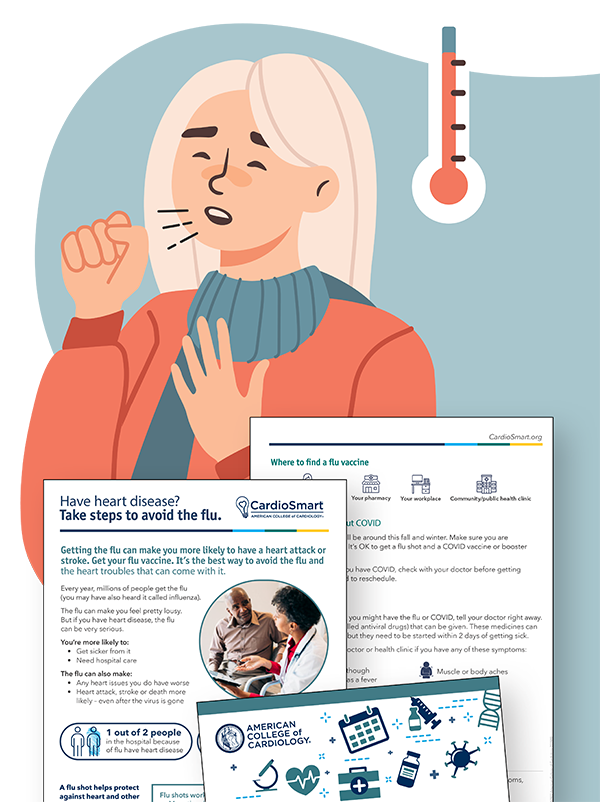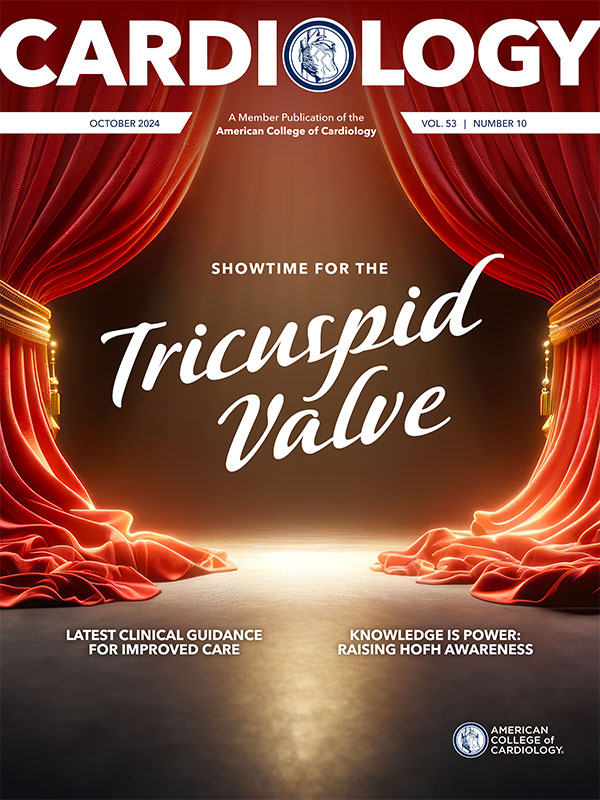Prioritizing Health | Preparing For Flu Season, Cold Weather

Fall is nearly here and it's time for reminding patients about the importance of vaccinations for the flu and for boosters for COVID-19. Patients with cardiovascular disease are particularly vulnerable and encouraging vaccination at every touch point is invaluable in helping them optimize their wintertime health.
HF and Influenza: A Combo For Substantial Morbidity, Mortality
Some patient groups may especially benefit from vaccination. Among patients with heart failure (HF), a study conducted in Denmark found that influenza was associated with about 2.6% of all-cause deaths, 2.9% of cardiovascular deaths and 5.0% of all hospitalizations with influenza or pneumonia.
The study, conducted by Daniel Modin, MD, et al., and presented at ESC Congress 2024 and simultaneously published in JACC, reviewed nationwide data from eight consecutive flu seasons (2010-2018) in an annual mean of 70,570 patients with HF. During the study, there was a mean of 9,462 all-cause deaths, 4,012 cardiovascular deaths and 5,359 hospitalizations for pneumonia or flu. Seasonal variation was seen during the winter months for these outcomes, but less so for hospitalization with HF outcomes.
CKD Patients Benefit From High-Dose Flu Vaccine

Patients with chronic kidney disease (CKD) received the same superior benefit as patients without CKD from a high-dose quadrivalent influenza vaccine (QIV-HD) compared with standard-dose quadrivalent vaccine (QIV-SD), according to a secondary analysis of the DANFLU-1 trial presented at ESC 2024 and simultaneously published in JACC.
The pragmatic, open-label DANFLU-1 feasibility trial, led by Katja Vu Bartholdy, MD, et al., and conducted during the 2021-2022 influenza season, randomized 12,477 Danish citizens aged 65-79 years to receive either a QIV-HD or QIV-SD vaccine and examined time to first and recurrent events, including hospitalization for influenza or pneumonia, cardiorespiratory disease, cardiovascular disease and COVID-19, as well as all-cause hospitalization and all-cause mortality. Follow-up for clinical outcomes was the time from 14 days after vaccination through May 31, 2022.
Nearly 20% of the 2,462 study patients (mean age, 73 years old; 45% women) had an estimated glomerular filtration rate of <60 mL/min/1.73 m2 on at least two occasions more than three months apart, a urine albumin-creatinine ratio >30 mg/g or a urine albumin >20 mg/L; none were on dialysis.
In the main study, 38 participants were hospitalized with influenza or pneumonia. In this analysis, CKD did not modify the effect of vaccine on first or recurrent events, with a lower incidence of hospitalization for flu with the QIV-HD vs. QIV-SD vaccine (hazard ratio [HR], 0.24).
Furthermore, the incidence rate ratio with the QIV-HD vaccine in CKD was 0.16 for recurrent hospitalization for influenza or pneumonia, 0.56 for cardiorespiratory disease and 0.77 for all-cause hospitalization. The rate of cardiovascular hospitalization was similar with both vaccines (21.9% with QIV-HD vs. 21.4% with QIV-SD).
Colder Weather Due to Climate Change Linked to MI Risk

New data suggest that short-term exposures to colder temperatures may be associated with an increased risk of hospitalization for myocardial infarction (MI). The study, presented at ESC Congress 2024 and simultaneously published in JACC, highlights the need for greater understanding of cold-related cardiac risks as climate change continues to result in shifts in weather patterns.
The population-based study of 120,380 Swedish patients admitted to hospitals for MI from 2005-2019 during the cold season of October through March found a decrease of 1-unit in percentile temperature at a lag of two to six days was significantly associated with increased risks of total MI, NSTEMI and STEMI.
Cold spells, defined as periods of at least two consecutive days with a daily mean temperature below the 10th percentile of the temperature distribution for each municipality, were also significantly associated with increased risks for total MI, NSTEMI and STEMI. However, Wenli Ni, PhD, et al., noted that lower air temperature and cold spells at a lag of zero to one days were associated with decreased risks for MI.
Their findings add to the growing body of evidence from other countries showing that lower air temperatures or cold spells were associated with increased MI risk.
"As climate change continues to induce complex shifts in regional weather patterns, indirectly subjecting certain areas to further cooling and more temperature variability, the need to enhance protections against common low temperatures and extreme cold to reduce cold-induced cardiac risks may become progressively important," write the authors.
JACC Editor-in-Chief Harlan M. Krumholz, MD, SM, FACC, said the study reveals a crucial link between cold weather exposure and heart attack risk, highlighting a delayed effect that peaks days after the cold spell. "These findings also underscore the urgent need for targeted interventions to protect vulnerable populations during and, particularly, after cold stress," he said.
In an accompanying editorial comment, Kai Chen, PhD, and Khurram Nasir, MD, MPH, MSc, FACC, note the study "provides compelling evidence of the delayed risk of MI following cold exposure, urging us to rethink our strategies and interventions."
They add that "addressing both ends of the temperature spectrum will ensure our health care systems are well-equipped to manage and mitigate these challenges, ultimately fostering a more sustainable and resilient cardiovascular future."

Related Resources
Get up to speed for the coming flu season with ACC's free online course, Taking the Lead: Flu and Cardiovascular Disease, and review the latest evidence adding more support to the importance of vaccination in patients with cardiovascular disease.
Be a part of encouraging all high-risk patients be vaccinated every year. Click here for the course, as well as infographics for clinicians and patients.
Visit CardioSmart.org/Flu to download infographics like this one and a discussion guide for talking with patients about adult vaccinations.
Clinical Topics: COVID-19 Hub, Prevention
Keywords: Cardiology Magazine, ACC Publications, Influenza Vaccines, Influenza, Human, COVID-19, Hospitalization, Vaccination

